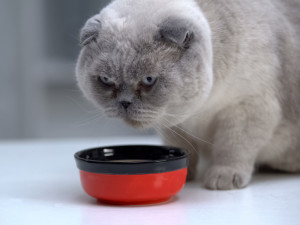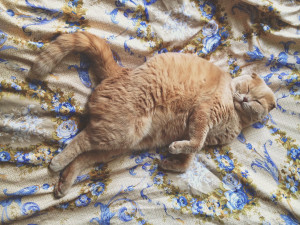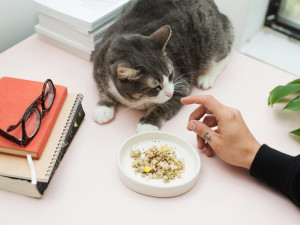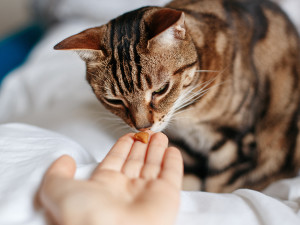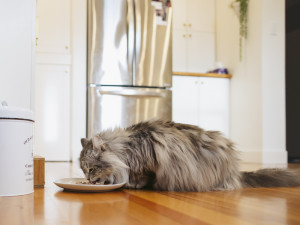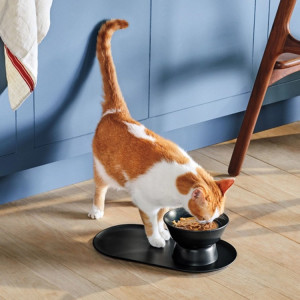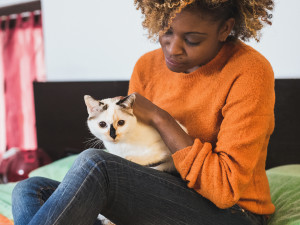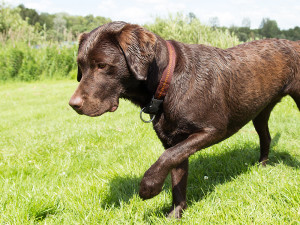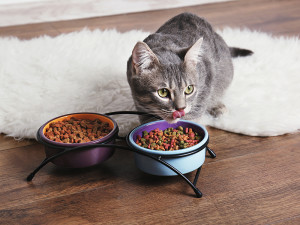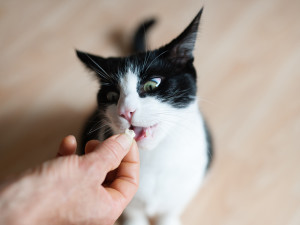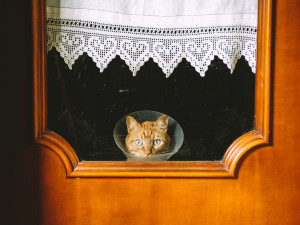Do Cats Need High-Calorie Cat Food?
Why you should only be packing on the calories in certain situations.
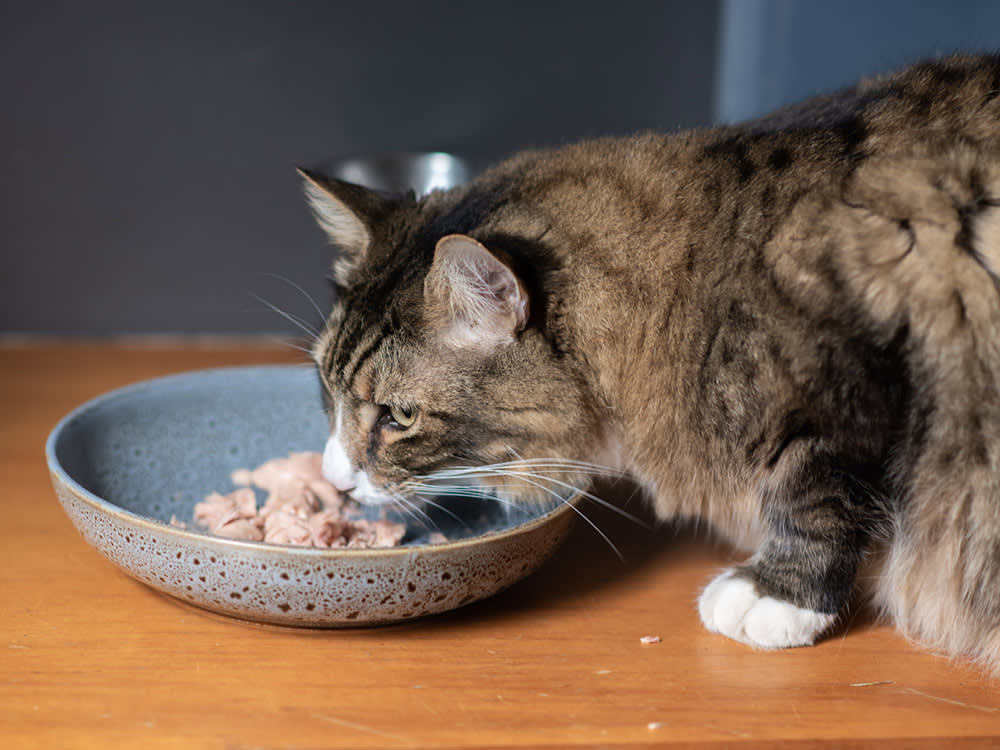
Share Article
If you’re looking at foods to feed your cat, and you’re getting the spins just from sheer confusion, don’t worry. There are so many specialized diets out there for cats aiming to address different health concerns, taste preferences, and nutritional needs. High-calorie cat foods are one of these broad categories, and it is important to know when and how to use them properly.
Unlike us, cats don’t normally treat themselves to the occasional high-calorie meal as much as they might want to. And while we might argue that we do need that second bowl of ice cream or that fancy coffee drink with the sprinkles, it is important to be aware of the downsides of feeding cats high-calorie diets or treats when it is not appropriate for their health.
So, how do you know if you are looking at a high-calorie cat food in the first place? Most of them are clearly labeled as such, and in many cases, these diets are only available with a prescription from your veterinarian. The reason is that it’s not common for a cat to need a high-calorie diet, and it would be even more unusual for it to be a good long-term choice. These diets are usually used by veterinarians to ensure a cat is getting enough calories when they might not be able to eat enough otherwise.
There are some over-the-counter diets that can also be considered high calorie, so it is best to check out the label of any food you are buying and look for some key information. First, make sure the food is labeled with a specific statement from The Association of American Feed Control Officialsopens in new tab (AAFCO) that it is complete and balanced to ensure it is appropriate as your cat’s daily diet. Second, look for information about what life stage the food is labeled for. Some foods will say they are labeled for all life stagesopens in new tab, while others may specify that they are appropriate only for adult cats. Once you know what to look for, you can consider if and when a high-calorie diet is appropriate for your cat.
When would you need to feed a high-calorie cat food?
For nursing cats and kittens
High-calorie foods are often used short-term for specific situations. The most common reason a vet would recommend a high-calorie diet would be for growing kittens, or cats who are pregnant or nursing. In these cases, however, packing on the calories is just one approach, and it is important to provide a food designed to meet all of their nutritional needs at these life stages.
Cats who are pregnant and/or nursing need at least twice as many calories per dayopens in new tab compared to other adult cats. The goal of these diets is to ensure that pregnant and nursing cats take in enough calories without getting too full. If they tried to get the same number of calories from a lower-calorie diet, they would have to eat much more of it, and they would simply get full before they ate enough calories.
For growing kittens, a similar dynamic occurs; tiny kittens’ stomachs only hold small amounts of food at a time. We want them to get the most out of those small meals by making sure they are calorie-and-nutrient dense. At the same time, we need to make sure these diets are balanced and appropriate as a long-term choice, not just high in calories. The best options to meet all of these needs are the foods labeled specifically for these life stages.
For cats who have a feeding tube
Another common reason for a cat to need a high-calorie diet would be if they have a feeding tube. A feeding tubeopens in new tab is a temporary measure that allows you or your vet to get nutrients into your cat while bypassing their mouth and their need to eat on their own. This is most often done with an esophagostomy tube, or E-tube, which is placed in the neck to allow easy syringe feedings. These tubes may be placed in cats who are not eating for prolonged periods of time, such as those with certain injuries or illnesses. The tube allows them to get enough nutrients while they are recovering.
A common condition when a cat will have a feeding tube is called fatty-liver disease, or hepatic lipidosis. These cats usually don’t want to eat, but it is critical to their recovery, so they may need the tube for a few weeks to months. High-calorie diets are very important for tube feedings because they allow cats to get enough calories with a smaller volume of food.
Because the food has to be liquefied to fit through the tube, it needs to be high in calories in order to provide enough energy without overly distending the stomach. In these cases, a veterinarian will provide very specific instructions, including a prescription high-calorie diet and precise quantities for the feedings based on calculations of your cat’s weight and nutritional needs.
What to know about high-calorie supplements
Cat parents should be wary of high-calorie supplements in the form of pastes and gels sold at pet stores or other over-the-counter suppliers. These products are usually high in sugar and do not provide useful nutrients. Most often, they are marketed to pet parents with young puppies and kittens as a means to avoid low blood sugar. While low blood sugar, or hypoglycemia, can occur in young kittens, it typically does not occur in healthy kittens.
Giving a healthy kitten this supplement is completely unnecessary. For those kittens who do truly have low blood sugar, there is almost always an underlying medical reason that needs to be treated in order for them to get better. These supplements will not treat the problem. A healthy kitten needs a balanced diet, and if they are getting a large portion of their daily intake from a supplement like this, they will not eat enough of the other foods they really need for healthy growth and development. Speak with your veterinarian if you are concerned about your cat’s health and only use a supplement like this under your vet’s supervision.
Reasons to avoid high-calorie diets
Healthy adult cats do not need high-calorie diets, even if you think your cat is the next Allyson Felix, who runs laps around the house at high speeds, swings from the shower curtain, and leaps across bookshelves.
Cats normally eat small frequent meals when they have to rely on catching prey, and a routine of feeding them a few small meals throughout the day is the healthiest schedule for them. If you are concerned that your cat is too thin, seems to be losing weight, or is hungry all the time, it is very important to see a vet. There is always a reason for this, and medical treatment will get your kitty back on track. A high-calorie diet cannot fix those underlying problems.
The downsides of high-calorie diets
For starters, these diets are often higher in fat than other diets, which can cause diarrhea in some cats. They are also more likely to lead to rapid weight gain, which is great when that is their intended use, but could quickly add up on a healthy cat. Obesity is a big concern for indoor cats because they generally tend to be less active and eat more than cats who have to hunt for their food.
Once a cat puts on weight, it is difficult to shed those pounds. Excess weight can lead to health problems including diabetes, joint pain, and reduced mobility. For these reasons, a high-calorie diet should only be used with the guidance of a veterinarian. Luckily, there are so many great diets available for cats that a suitable option exists for the kitty who’s as picky as your anti-broccoli toddler.

Dr. Amy Fox, DVM
Amy Fox, DVM is a small animal veterinarian in New York City. A lifelong animal lover, Dr. Fox studied biology in college and then worked as a veterinary nurse before pursuing veterinary school at Cornell University. She has worked in many different settings including shelter medicine, emergency medicine, general practice, and animal cruelty and forensics. She is especially interested in nutrition, preventative medicine and care for senior pets. Dr. Fox also enjoys writing about veterinary medicine and teaching. In her free time she loves to cook, garden, and go for long runs.
Related articles
![A cat eating out of a black bowl from the brand, cat person.]()
6 Best Fresh Cat Food Delivery Services That Will Have Your Kitty Purring at Full Volume
It’s like Postmates — but for you spoiled cat.
![Woman petting her cat]()
Don’t Come For Us, But Is Your Cat Overweight?
We love a chonky cat, but here’s what you should know.
![Brown Labrador lifting front leg]()
How to Get a Head Start on Your Pet’s Health
Spot lumps, limps, and lethargy early on.
![Grey cat at looking up from eating on floor at home]()
Gut Feelings: How to Balance Your Pet’s Microbiome
The mind-gut connection isn’t just for people. Your dog or cat’s gut microbiome plays a big role in their health and well-being.
![Black and white cat eating a cat treat from a man's hand]()
12 Best All-Natural Cat Treats
Some are sustainable, others are organic, but all are endorsed by discerning foodies (a.k.a. cats).
![cat with cone after vet visit]()
Doctor’s Orders: Cat Vet Visits Are Essential
Get thy cat to a vet, even if it’s a struggle to get them out the door.

